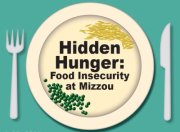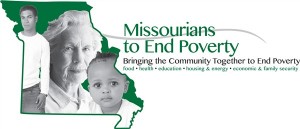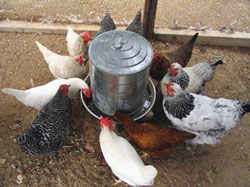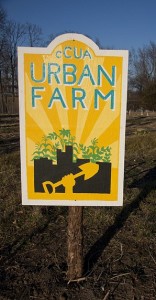
April 11, 2013
Hidden Hunger at Mizzou
Hunger on college campuses is often overlooked, but with increasing costs for tuition and housing, students often find themselves pinched. Students at the University of Missouri recently organized an event to bring the issue to light. Co-hosted by the Women’s Center, Tiger Pantry (MU’s campus-based food pantry), and the Environmental Leadership Office, Hidden Hunger included a panel of MU students who shared their personal stories about dealing with food insecurity. Ashley Vancil, a graduate student with the Interdisciplinary Center for Food Security, moderated the panel. More information about the forum can be found at the Maneater and…

March 26, 2013
Poverty Summit Brings Together Advocates and Experts
The 2013 Poverty Summit, sponsored by Missourians to End Poverty, took place on April 9th in Jefferson City, Missouri. The summit provided an opportunity for organizations and advocates from across the state to network, learn from one another, and develop strategies for addressing poverty in Missouri. This year’s summit featured the notable Peter Edelman, author of So Rich So Poor: Why It’s So Hard to End Poverty in America, who discussed issues related to wealth disparities, unemployment, and the working poor. Other featured speakers included Eileen Wallace and Gene Nichol. More information about the summit can…

Jan. 15, 2013
Center Receives Grant to Expand Work with Food Pantries
The Missouri Foundation for Health recently awarded the Interdisciplinary Center for Food Security (ICFS) a five year, nearly $500,000 grant to expand nutrition related activities with food pantries in Missouri. With this grant, the Center will build upon its current Food Pantry Nutrition Project. “We are very honored to receive this grant and are excited by the opportunity it will provide to take this work to the next level,” said Bill McKelvey, project coordinator. A primary goal of the project is to help food pantries find ways to get healthier food into the hands of…

Dec. 20, 2012
USDA Report: The Concentration of Poverty is a Growing Rural Problem
The December edition of Amber Waves highlights a concerning trend: the growth and concentration of rural poverty. While poverty grew throughout the United States as a result of the 2001 and 2007-2009 economic recessions, it grew faster in rural areas, compared to metropolitan areas. The report notes that “in 2006-10, 26.2 percent of the Nation’s nonmetro [i.e. rural] counties were high poverty, 5.8 percentage points higher than in 2000.” By comparison, 10.3 percent of metropolitan counties were high poverty counties in 2006-10, increasing 3.7 percentage points from 2000. The report also points to the impact of poverty, noting that…
![Belo Horizonte, Brazil - By Benjamin Thompson (Flickr: Belo Horizonte, Brazil) [CC-BY-SA-2.0 (http://creativecommons.org/licenses/by-sa/2.0)], via Wikimedia Commons](https://foodsecurity.missouri.edu/wp-content/uploads/2012/12/Belo_Horizonte_Brazil_builgins-300x199.jpg)
Dec. 13, 2012
The City that Ended Hunger
A Yes magazine article by Frances Moore Lappé tells the story of how Brazil’s fourth largest city, Belo Horizonte, tackled the issue of hunger. Using a combination of policy and market measures, along with citizen engagement, the city reached nearly 40 percent of it’s 2.5 million citizens through various hunger relief and nutrition efforts and reduced infant mortality by half over a 10 year period. In particular, the city worked to link local farmers with consumers through the establishment of farmers’ markets, used pricing schemes to make certain fruits and vegetables more affordable, and established “People’s Restaurants” (Restaurante…

Dec. 5, 2012
Community Food Systems and Food Banks
The Community Food Resource Center, part of the Community Food Bank of Southern Arizona, stands out for their efforts to incorporate programs and projects that link people to community-based food systems. They have active home and community gardening programs, a 2.5 acre urban farm, and farmers’ markets that provide a source of fresh food to the community. The Resource Center also supports a unique Community Food Consignment Program which enables home gardeners and small farmers to consign their produce for sale at local farmers’ markets. Robert Ojeda, vice president of the Community Food Resource Center, was recently…

Oct. 2, 2012
Catching up with the Columbia Center for Urban Agriculture
The Columbia Center for Urban Agriculture, a non-profit organization in Columbia, Missouri, has been working to expand fresh food options in central Columbia since 2008. The group began with a small demonstration garden and has grown to include a 1.3 acre urban farm, an on-site farm stand that accepts SNAP benefits, an Opportunity Gardens program (helping people install and maintain vegetable gardens at their homes), youth gardening education, a landscaping division, and more. The Columbia Daily Tribune recently caught up with the group just before their 3rd Annual Harvest Hootenanny Fundraiser. Read the rest of the story.
- « Previous
- 1
- 2